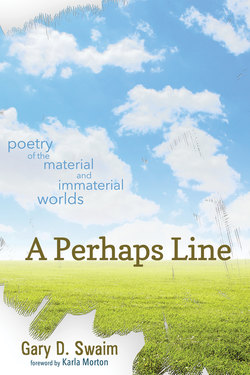Читать книгу A Perhaps Line - Gary D. Swaim - Страница 3
На сайте Литреса книга снята с продажи.
Foreword
ОглавлениеThe Sufi’s have a philosophy about life and the afterlife.
They believe love is the greatest thing in the world – greater than education, greater even than religion. Although this last point caused them great grief in their early days, it has a forward logic: Religion has man’s hands all over it, but true love is between a person and their God, and love, ultimately, is the only thing we are able to take with us into the next life. Therefore, it is imperative that we build our stores and stock our lives with love—both on a physical and spiritual level, as they ultimately connect.
Gary Swaim is this type of spiritual man.
His collection of poetry dives into both the material and the eternal, wafting in what Swaim himself identifies as “. . .poems rough around their edges from passing back and forth through ‘a perhaps line,’ uncertain of their places.”
He is a forward thinker, examining faith in both the conscious as well as the unconscious extremes such as his series on his hallucinations stemming from his six month hospital stay, when he was in a coma for 54 days.
“I may be no Einstein,
but I’m in here. Look at me. Look at me.”
He could hear the words being said around him, trapped speechless and eyes closed in his own body. He felt the priest’s thumb on his forehead as he was given his last rights. How terrifying. “We are all quietly wounded” he says, but the wounds of being buried in oneself put us to the ultimate test.
This book of poetry is a risk of mind, of heart. Swaim puts his whole self into a work that asks the reader to decide their own beliefs. We discover who we are by what we believe, and Swaim offers his own life to help us along our path. At times, we are caught between reality and hallucination, as they seamlessly tie into each other.
In the poem These Arms, These Shoulders, his hallucinations stem of thirst:
“Could I have some water?”
“We’ll have to raise your head, a 45-degree angle, at least.”
“I’m a runner, Just pass the water to me
as I run by. I’ve done it many times.”
“No. You’ve forgotten where you are. I must
lift your head. I’ll hold the cup. Drink slowly.”
“Never mind. I can’t waste time. I still have
eight miles to go.”
And I run. I’m breathing hard. Beauties of high
desert reds now lash my eyes, and it’s Kierkegaard
I hear speaking of the individual alone before God.
I am alone as I run in my full body cast.”
Indeed, it is Kierkegaard’s idea of existentialism that flows through this work—the idea that it is up to the individual (not society or religion) to give meaning to life, and to live it “passionately, sincerely, authentically.”
Swaim does just this, pushing the boundaries of heaven, striving for eternal meaning in the chaos and pain of this everyday world, at times, lashing out:
“What’s next God? You gonna
give me a criminal son in my old age?”
But perhaps the most moving poems in this book come in the second half, when Swaim examines the Stations of the Cross. These 14 poems detail the events that happen to Jesus on his way to be crucified, beginning with the judgment of Pilate, when Jesus is condemned to death, the stumbling, the scourging, the Pieta, ending with the burial.
“Our world is fallen,” Swaim reminds us.
We humans are heavily flawed.
But this book of poetry takes us into an aura of hope only found when we view our own lives amid our own sickness, poverty and weakness, and find the courage to love, despite circumstance.
This book will take you on a journey deep into self.
That is where you will find the ladder.
That is where you will find your faith.
—Karla K. Morton
Karla K. Morton, the 2010 Texas Poet Laureate, is a member of the Texas Institute of Letters, a Texas A & M graduate, and Board Member of the Greater Denton Arts Council. A broadly published poet, her books include Redefining Beauty, Becoming Superman, Stirring Goldfish, Names We’ve Never Known, and Karla K. Morton: New and Selected Works. Additionally, she is a two-time Indie National Book Award winner.
